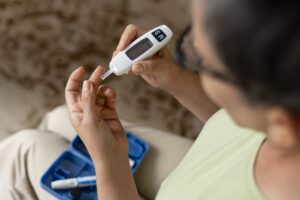Diabetes is a chronic condition that affects millions of people worldwide, but what if I told you that it’s possible to reverse this disease and achieve remission through lifestyle changes? In this article, we’ll dive deep into the concept of diabetes reversal, exploring the role of diet, exercise, stress management, and other factors in regaining control over your health.
Understanding Diabetes Reversal
Diabetes reversal, also known as type 2 diabetes remission, is the process of achieving normal blood sugar levels without the need for medication. This is a remarkable feat, as it challenges the traditional notion that diabetes is a lifelong, incurable condition. By making strategic lifestyle modifications, many individuals have been able to effectively manage and even eliminate their diabetes symptoms.
The key to diabetes reversal lies in addressing the underlying causes of the disease, such as insulin resistance, obesity, and an unhealthy lifestyle. By adopting a holistic approach that focuses on diet, physical activity, stress management, and other lifestyle factors, we can work towards restoring our body’s natural ability to regulate blood sugar levels.
The Role of Lifestyle Changes in Diabetes Reversal

Achieving diabetes reversal is not a quick fix, but rather a journey that requires commitment and dedication to sustainable lifestyle changes. Addressing underlying factors such as insulin resistance through diet, exercise, and other interventions can have a profound impact on our overall health and well-being, not just our diabetes management.
Diet and Nutrition for Diabetes Reversal:
- Adopt a whole-food, plant-based diet rich in fiber, healthy fats, and complex carbohydrates
- Reduce or eliminate processed foods, added sugars, and refined carbohydrates
- Incorporate nutrient-dense foods that help regulate blood sugar levels, such as leafy greens, berries, and legumes
- Experiment with intermittent fasting or time-restricted eating to improve insulin sensitivity
Exercise and Physical Activity for Diabetes Reversal:
- Engage in regular physical activity, such as brisk walking, cycling, or swimming, for at least 30 minutes per day
- Incorporate strength training exercise to build muscle and boost metabolism
- Explore activities that you enjoy, as this will help you stick to a consistent exercise routine
Stress Management and Mental Well-being for Diabetes Reversal:
- Practice stress-reducing techniques, such as meditation, deep breathing, or yoga
- Engage in activities that promote relaxation and mental clarity, like journaling or spending time in nature
- Seek support from healthcare professionals, support groups, or mental health counselors to address any underlying emotional or psychological factors
Sleep and Its Impact on Diabetes Reversal:
- Aim for 7-9 hours of quality sleep each night to support your body’s natural hormone balance and metabolic processes
- Establish a consistent sleep routine and create a sleep-conducive environment
- Avoid electronics and stimulating activities before bedtime to promote better sleep quality
By integrating these lifestyle changes into your daily routine, you can take a significant step towards achieving diabetes reversal and improving your overall health.
Monitoring and Managing Blood Sugar Levels

Closely monitoring and managing your blood sugar levels is a crucial aspect of the diabetes reversal journey. Regular glucose monitoring, whether through finger-prick tests or continuous glucose monitoring (CGM) devices, can provide valuable insights into how your body responds to different foods, activities, and lifestyle factors.
Keeping a detailed log of your blood sugar readings, along with any relevant notes on your diet, exercise, and other daily activities, can help you identify patterns and make informed decisions about your diabetes management. Additionally, working closely with your healthcare team to interpret your data and adjust your treatment plan as needed can further support your path to diabetes reversal.
Medications and Supplements for Diabetes Reversal
While lifestyle changes are the primary driver of diabetes reversal, some individuals may benefit from the strategic use of medications or supplements to support their efforts. Your healthcare provider can help you determine if any of the following options may be appropriate for your specific situation:
- Metformin: This first-line medication for type 2 diabetes can help improve insulin sensitivity and reduce blood sugar levels.
- GLP-1 agonists: These injectable medications can stimulate insulin production, suppress glucagon secretion, and promote weight loss.
- Supplements: Certain supplements, such as berberine, alpha-lipoic acid, or chromium, may have a positive impact on insulin sensitivity and blood sugar regulation.
It’s important to work closely with your healthcare provider to understand the potential benefits and risks of any medications or supplements, and to ensure that they are used in a safe and effective manner to support your diabetes reversal goals.

Support and Resources for Achieving Diabetes Remission
Embarking on the diabetes reversal journey can be challenging, but you don’t have to do it alone. There are numerous resources and support systems available to help you along the way:
- Diabetes education programs: Seek out local or online programs that provide comprehensive education and guidance on lifestyle changes for diabetes management and reversal.
- Peer support groups: Connect with others who are also working towards diabetes reversal, as the camaraderie and shared experiences can be invaluable.
- Online communities: Explore online forums, social media groups, and websites dedicated to diabetes reversal and healthy living.
- Healthcare team: Maintain regular communication with your healthcare provider, nutritionist, and other members of your care team to ensure you’re on the right track.
Conclusion
Remember, achieving diabetes remission is a highly personal journey, and what works for one individual may not work for another. Be patient, stay persistent, and celebrate even the smallest of victories along the way.


